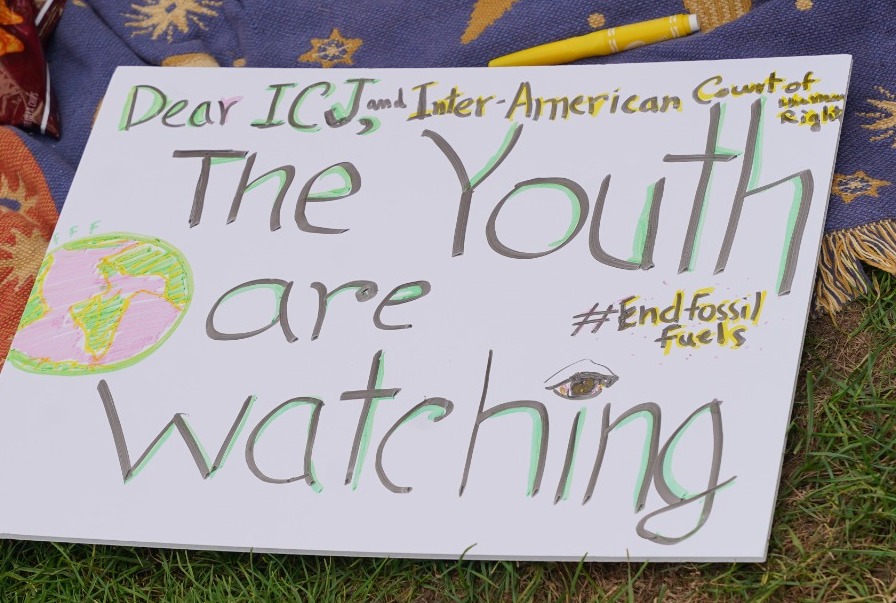Youth Demand Climate Justice Now in the World’s Highest Courts

Last Friday, as NYC Climate Week came to a close with its Summit of the Future at United Nations Headquarters, an international coalition of youth climate activists came together at Central Park in a powerful demonstration of solidarity and determination. Our shared goal: to demand that the upcoming advisory opinions on climate change and human rights from the International Court of Justice (ICJ) and Inter-American Court of Human Rights (Inter-American Court) have the ambition and urgency needed to ensure climate justice now.
The climate crisis is an unprecedented, escalating human rights emergency that significantly impacts young people’s rights to life, health, equal protection, and a healthy environment, among many other rights that further exacerbate young people’s ability to take part in decisions regarding our future. As the unequal effects of climate impacts are becoming more evident, young people are leading the way in demanding accountability from polluters.
However, with current policies, we are not acting fast enough to meet the climate emergency and are failing to ensure intergenerational climate justice, as climate commitments remain voluntary, action plans remain undefined, and we hurtle closer to breaching 1.5°C. Waiting for climate action, or even a 2°C target, is not enough to meet the climate emergency, and young people and frontline communities need solutions today.
Advisory opinions (AOs) can serve as one avenue to demand fast mitigation that can slow the rate of warming now to protect all of us before it is too late. As States have a duty of care obligation to protect their citizens, the AO movements before the ICJ and Inter-American Court provide a unique opportunity to demand climate justice. This is a very powerful chance for young people to engage with the courts in a meaningful way, urge courts to hold governments and corporate polluters accountable, and be heard and listened to in a way that empowers and uplifts our lived experiences and concerns about the climate emergency.
This includes calling for countries to ratify the Escazú Agreement that seeks to promote the rights of access to information, participation and justice in environmental issues and the protection of environmental defenders. This agreement is fundamental to ensuring transparent, participatory, and inclusive environmental and climate governance. Escazú came into force in April 2021 and has already been ratified by 15 countries, including Argentina, Chile, Mexico, and Uruguay. Brazil signed the agreement in 2018 and the document has already been sent by the federal government to the National Congress. Now, the text needs to be approved by congressmen and senators, so that it can be subsequently ratified. We invite everyone to take part in the campaign, 513 Voices For Escazú, by sending their videos to pressure the Brazilian Congress through @escazubrasil.
Responding to a climate emergency requires a climate justice-centered approach, which includes strengthening human rights and climate protection for present and future generations within the 1.5°C target. Failing to act quickly on climate violates the principle of intergenerational equity and breaches international, regional, and domestic law. Through our rights-based systems, human rights courts can strengthen climate action, which includes (but is not limited to): ending fossil fuels, holding polluters accountable, transitioning to renewables, cutting 45% of methane emissions by 2030, stopping deforestation, ensuring that climate finance and mitigation does not replicate our histories of colonization, preserving and enhancing carbon sinks while respecting land rights, and protecting climate activists and environmental defenders.
As the world’s biggest historic polluter, the U.S. has a responsibility to lead a global and just transition into clean energy. Around 75,000 people took to the streets during NYC Climate Week to send a message: if the Biden administration doesn’t act, it risks losing a key part of its electoral base – tens of thousands of people who are frustrated with Biden’s inaction on climate and willing to take to the streets in protests. Our future has been taken over by oil and gas corporations and their government allies. They are trying to decide our futures, but we will not let them. We are taking back the power to determine our own future.
We are the last generation that can do something now to prevent surpassing the 1.5°C guardrail and keep the planet livable for current and future generations.
This is our message to world leaders and the world’s highest courts: the youth are watching, and we demand that the upcoming AOs call for ambitious and concrete climate action to protect intergenerational climate justice.
For more information about the campaign and to support our efforts, please reach out to us!
Media Contacts:
FACE Intergenerational Justice, Trina Chiemi: trinachiemi@gmail.com
PISFCC, Siosiua Veikune: siosiua@pisfcc.org
